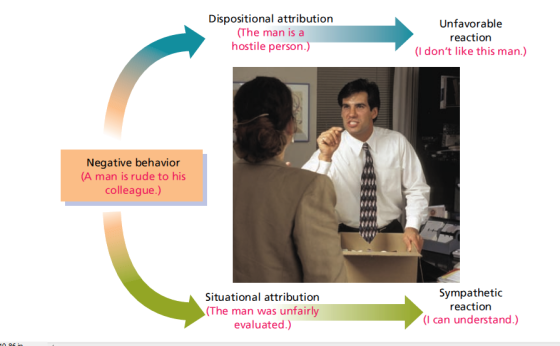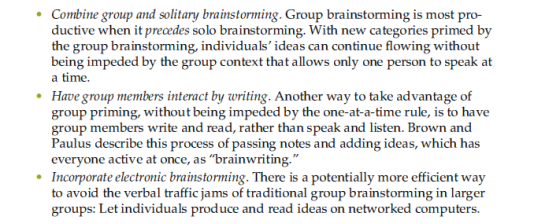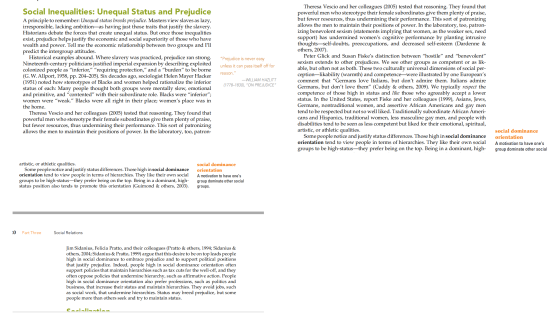Sharing is caring. I will update this page when appropriate. 🙂
Why social psychology, Zi Siong? Well…
“Social psychology aims to expose us to fallacies in our thinking in the hope that we will
become more rational, more in touch with reality.” [Point number 8 actually, haha]
1) “We find causes where we look for them. To see this in your own experience, consider: Would you say your social psychology instructor is a quiet or a talkative person? My guess is you
inferred that he or she is fairly outgoing. But consider: Your attention focuses on your
instructor while he or she behaves in a public context that demands speaking. The instructor
also observes his or her own behavior in many different situations—in the classroom, in
meetings, at home. “Me talkative?” your instructor might say. “Well, it all depends on the
situation.” ”
2) “People who are more self-conscious attribute their behaviour more to internal factors and less
to the situation.”
3) “The fundamental attribution error: observers underestimating the situation. Driving into a gas
station, we may think the person parked at the second pump (thus blocking access to the first)
is inconsiderate. That person, having arrived when the first pump was in use, attributes her
behavior to the situation.”
4) “From his analysis of 173 studies, Bertram Malle (2006) concluded that the actor-observer
difference is minimal. When our action feels intentional and admirable, we attribute it to our
own good reasons, not to the situation. It’s only when we behave badly that we’re more likely
to attribute our behavior to the situation, while someone observing us may spontaneously infer
a trait.”
5) “We often ignore powerful situational determinants. Why do we tend to underestimate the
situational determinants of others’ behavior but not of our own? Attribution theorists pointed
out that we observe others from a different perspective than we observe ourselves (Jones, 1976;
Jones & Nisbett, 1971). When we act, the environment commands our attention. When we watch
another person act, that person occupies the center of our attention and the environment
becomes relatively invisible.”
6) “People who are merely feigning a position write more forceful statements than you’d expect
(Allison & others, 1993; Miller & others, 1990).”
7) “In real life, those with social power usually initiate and control conversations, which often
leads underlings to overestimate their knowledge and intelligence. Medical doctors, for
example, are often presumed to be experts on all sorts of questions unrelated to medicine.”
8) “Social psychology aims to expose us to fallacies in our thinking in the hope that we will
become more rational, more in touch with reality.”
9) “This tendency resolves a puzzling pair of consistent findings: Those who participate in
psychotherapy and self-improvement programs for weight control, antismoking, and exercise show only modest improvement on average. Yet they often claim considerable benefit (Myers, 2010). Michael Conway and Michael Ross (1986) explain why: Having expended so much time, effort, and money on self-improvement, people may think, “I may not be perfect now, but I was worse before; this did me a lot of good.””
10) “Our memory system is a web of associations, and priming is the awakening or activating of
certain associations. Experiments show that priming one thought, even without awareness, can
influence another thought, or even an action. John Bargh and his colleagues (1996) asked people to complete a sentence containing words such as “old,” “wise,” and “retired.” Shortly
afterward, they observed these people walking more slowly to the elevator than did those not
primed with aging-related words. Moreover, the slow walkers had no awareness of their walking
speed or of having just viewed words that primed aging.”
11) “As social chameleons, those who score high in self-monitoring are also less committed to their relationships and more likely to be dissatisfied in their marriages (Leone & Hawkins, 2006).”
12) “Social networking sites such as Facebook provide a new and sometimes intense venue for self presentation. They are, says communications professor Joseph Walther, “like impression
management on steroids” (Rosenbloom, 2008). Users make careful decisions about which pictures, activities, and interests to highlight in their profiles. Some even think about how their
friends will affect the impression they make on others; one study found that those with more
attractive friends were perceived as more attractive themselves (Walther & others, 2008). Given
the concern with status and attractiveness on social networking sites, it is not surprising
that people high in narcissistic traits thrive on Facebook, tallying up more friends and
choosing more attractive pictures of themselves (Buffardi & Campbell, 2008).”
13) “When we behave badly or fail in a task, we reassure ourselves by thinking that such lapses
also are common. After one person lies to another, the liar begins to perceive the other person
as dishonest (Sagarin & others, 1998). They guess that others think and act as they do: “I lie,
but doesn’t everyone?” If we cheat on our income taxes or smoke, we are likely to overestimate
the number of other people who do likewise.”
14) “Most cultures native to Asia, Africa, and Central and South America place a greater value on
collectivism. They nurture what Shinobu Kitayama and Hazel Markus (1995) call the
interdependent self. In these cultures, people are more self-critical and have less need for
positive self-regard (Heine & others, 1999). Malaysians, Indians, Japanese, and traditional
Kenyans such as the Maasai, for example, are much more likely than Australians, Americans, and
the British to complete the “I am” statement with their group identities (Kanagawa & others,
2001; Ma & Schoeneman, 1997).
15) “When speaking, people using the languages of collectivist countries say “I” less often (Kashima & Kashima, 1998, 2003). A person might say “Went to the movie” rather than “I went to the movie.” ”
* Collectivism: Giving priority to the goals of one’s groups (often one’s extended family or
work group) and defining one’s identity accordingly.
* Interdependent self: Construing one’s identity in relation to others.
16)

17) “With remarkable ease, we form and sustain false beliefs. Led by our preconceptions, feeling overconfident, persuaded by vivid anecdotes, perceiving correlations and control even where none may exist, we construct our social beliefs and then influence others to confirm them. ”
18)

19) On how to enhance group brainstorming: 20)
20) 
21) “We are more prone to ingroup bias when our group is small and lower in status relative to the outgroup (Ellemers & others, 1997; Mullen & others, 1992). When we’re part of a small group surrounded by a larger group, we are more conscious of our group membership; when our ingroup is the majority, we think less about it. To be a foreign student, to be gay or lesbian, or to be of a minority race or gender at some social gathering is to feel one’s social identity more keenly and to react accordingly.”
22) “The extra attention we pay to distinctive people creates an illusion that they differ from others more than they really do. If people thought you had the IQ of a genius, they would probably notice things about you that otherwise would pass unnoticed.”
23) 





 20)
20) 

